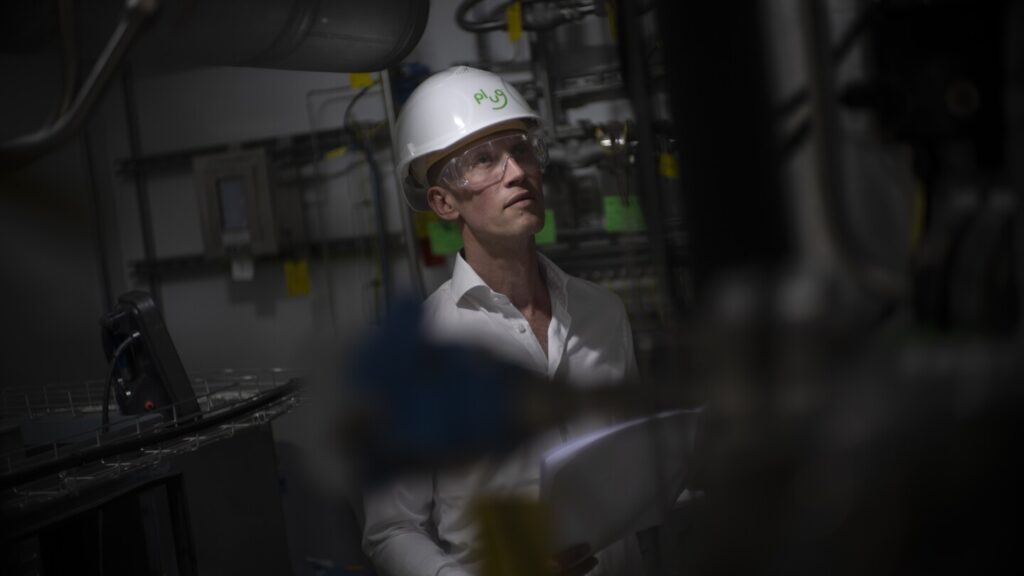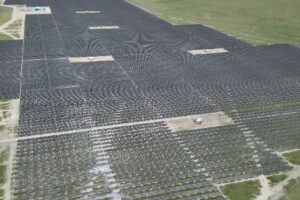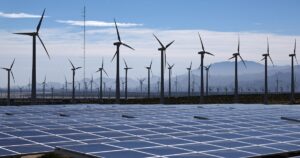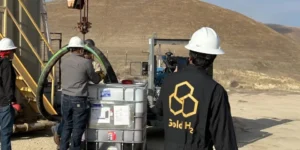Profiles in clean energy: Dad concerned about climate change shifts company away from oil and gas

ALPHEN AAN DEN RIJN, Netherlands (AP) — At first, working in the oil and gas industry was great, Jordi Zonneveld recalls.
Near his home in the Netherlands, there was an oil and gas company that, back in 2005, was growing and hiring. Zonneveld knew nothing about its business, which was designing and building equipment used to separate oil and gas from the salty water they’re mixed with deep underground. That was a far cry from what he had studied in college, aviation. But he was happy to get a job.
Jordi Zonneveld poses for a portrait at Plug Power where they produce green hydrogen in Alphen aan den Rijn, Netherlands, Friday, June 16, 2023. (AP Photo/Peter Dejong)
At just 21, Zonneveld found himself working as a project engineer with customers and managing engineering teams. It was heady and challenging. The company, Frames Group, in the city of Alphen aan den Rijn, did very well. Zonneveld was promoted every few years.
But in the oil and gas industry the year 2015 was a turning point for many people, and Zonneveld was one. The price of oil crashed. Major companies around the world halted or postponed large projects. Sales at the Frames Group plummeted. The same year, the Paris climate agreement was signed, committing countries to reducing greenhouse gas emissions, the same emissions produced by his industry.
“The whole world is declaring to phase out fossil fuels,” Zonneveld said. It wasn’t going to be immediate, “but we were relying on those fossil fuels 100%.”
______
EDITOR’S NOTE: This is part of an occasional series of personal stories from the energy transition — the change away from a fossil-fuel based world that largely causes climate change.
______
Zonneveld and his coworkers discussed all of this and decided the oil and gas industry was not where they wanted to make their careers. They were still young. “I still needed to work about 30 years until my retirement, I imagine. So you know, just wait and see what happens — this was not an option,” he said.
He had become a father, with two daughters, and didn’t want them to live in a world reliant on burning oil, gas and coal, warming the planet.
“I don’t have the illusion I can change everything myself, but I can be a part of the whole transition,” he said.
By this time he was in top management. He considered his company’s specialty in separating oil from gas, and removing unwanted water and vapors.
Jordi Zonneveld works at Plug Power where they produce green hydrogen in Alphen aan den Rijn, Netherlands, Friday, June 16, 2023. (AP Photo/Peter Dejong)
He began to see a path: green hydrogen.
Hydrogen is a gas that can be burned like a fossil fuel and generate high heat. But it does not create emissions that warm the Earth. In a way, a tank of hydrogen is like a battery — it can store clean energy over days, weeks or even months. It can power trucks, planes and boats, and also be used to make steel, ammonia and fertilizer.
But most of the hydrogen used today is made from a fossil fuel, natural gas.
Zonneveld wanted to pull Frames Group toward the future by making green hydrogen, that is, hydrogen obtained by splitting water into its elements, using only clean electricity. His employees’ skills would be transferrable.
“The interesting thing with hydrogen is that if you have a lot of knowledge about gases like natural gas … then designing a system for hydrogen is just another gas,” Zonneveld said. “It’s a bit more complex than that, especially if you ask our engineers. But I mean, on a high level, it is just another gas.”
Some of his longtime oil and gas colleagues didn’t like the new direction, after all, the world was not moving away from fossil fuels anytime soon.
Zonneveld conceded it might take decades, but the Frames Group could lead the way. He and a small team pressed forward and were able to increase clean hydrogen to 10% of the company’s business over the next five years.
Around this same time, in New York, the clean energy company Plug Power, focused on hydrogen and fuel cells, was building out its hydrogen business.
The two companies shared a desire to help customers decarbonize their operations, and the belief that hydrogen will play a big role in the clean energy transition. Plug Power decided to acquire Frames Group, a merger that happened in 2021.
“There were very few oil and gas companies where you had leadership that had such a vision,” Plug Power CEO Andy Marsh said in an interview. So it was a perfect match between Plug’s vision and Jordi’s personal vision of what Frames Group could become.”
Now Plug Power has a goal of producing over 1,000 tons per day of green hydrogen globally this decade.
There have been challenges. Plug Power’s stock has been volatile. It has yet to turn a profit. That is not unusual in a new industry.
On the positive side, Plug Power has found some big customers, including Amazon. Plug Power technology now runs forklifts in 80 Amazon warehouses. Amazon is also now making its own clean hydrogen on-site in Aurora, Colorado using a machine called an electrolyzer, made by Plug Power.
The Biden administration is doling out billions of dollars in tax credits to companies that make this kind of clean hydrogen. Plug Power is in line for some of that money. The Department of Energy is helping finance the construction of up to six of the company’s hydrogen production plants. Plug Power opened its first clean hydrogen plant in January in Georgia, and also owns factories for making electrolyzers and fuel cells in Rochester and Slingerlands, New York.
Frames Netherlands office is finishing out its last oil and gas projects. Marsh said he put Zonneveld in charge there because he’s a “dreamer.”
Zonneveld, 39, now has three daughters. He has talked about climate change and his work with his eldest. He began driving a hydrogen car in 2020. When the two are in the car together, he explains how this kind of car is different from others on the road and better for the environment. The topic is a bit difficult for her at age 11, he said, and she’s not always happy when they have to drive farther to reach a hydrogen refueling station. But she understands that the world needs to move away from fossil fuels.
His other two daughters are 9 and 1. He doesn’t talk as much with them about it yet, but says he’s proud of becoming part of the solution.
“We made a change,” he said, “and I’m sure when they get a bit older, they will also be proud of me.”
___
McDermott reported from Providence, Rhode Island.
___
The Associated Press’ climate and environmental coverage receives financial support from multiple private foundations. AP is solely responsible for all content. Find AP’s standards for working with philanthropies, a list of supporters and funded coverage areas at AP.org.




